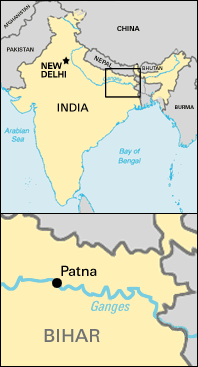Editor's note: Grad students Amit Sinha, David Plink, Julie Earne, Mona Gavankar and undergrad Dhruti Patel will be filing regular dispatches from India this summer. We'll publish their dispatches online here. This is their first report.
 |
This summer, we have traveled to India to help Janani, a nonprofit family-planning agency, improve and broaden its services in rural areas. We're here thanks to the Clausen Center for International Business and Public Policy at the Haas School of Business, UC Berkeley, as part of an International Business Development project where student teams work on consulting assignment with corporations and nonprofit organizations globally.
A growing problem
Bihar, where we will work, lies in the east of India, bordering Nepal. It is one of the poorest states in India, with 42.6 percent of the population living below the poverty line. The most rural among India's major states, Bihar has a very high total fertility rate (4.3 children per family) and a low literacy rate (47.5 percent). The prevalence of contraceptives there has remained very low; by 2007, it is expected to be the lowest of all the states.
The challenge
|
Bihar faces some desperate challenges in curbing its growth and improving the health of its population, particularly that of its women and children. The health figures are dismal. More than 37 percent of married women aged 15 to 44 years (almost 60 percent of marriages involve brides under 18 years old) report symptoms of reproductive tract and sexually transmitted infections. Over 43 percent of women suffer complications during pregnancy, as do 75 percent of women during delivery and 65 percent after delivery.
Bihar's infrastructure makes providing health services a challenging task. In 2001, there was one doctor for every 3,347 citizens in Bihar, compared with the national ratio of 1 to 1,855. There are 12 times fewer nurses in the state than the average. But with 22,670 registered pharmacies and 31,000 doctors, there are also opportunities to effect change in the private sector.
Sun rising
We will work with Janani, an Indian nonprofit organization focused on providing family planning services in Bihar, Jharkhand and Madhya Pradesh, three of the poorest states of India and home to about 200 million people. Through its network of Titli centers and Surya clinics, it provides affordable family planning tools and services to people who would not have access to those services otherwise. An affiliate of DKT International (a U.S.-headquartered charitable organization), Janani's program draws on private-sector resources through social marketing and social franchising techniques.
Janani's referral clinics are located in large and small towns.
They use the brand name and logo of "Surya," meaning "sun," to
suggest energy, rejuvenation, hope, brightness and good health.
The clinics are based on a franchised health system comprising
a network of formally qualified, state-registered doctors who
do not have rural practices. Now, through a referral system,
they offer a range of clinical family planning services to
the most isolated rural populations, including
vasectomies,
tubal ligations, contraceptive injections, and treatment for
sexually transmitted diseases.
We have been working with Janani since
February 2003 from Berkeley. Once on site, we will analyze Janani's efforts
to expand the number of Surya clinics in Bihar, focusing primarily on increasing
the
number of the clinics' services, the ownership structure and possible new sources
of income. We will also analyze how recent changes in Indian health insurance
impacts the client base and revenues for Surya clinics and explore partnering
relationships with the insurance industry.
— Amit Sinha, David Plink, Julie Earne,
Mona
Gavankar, and Dhruti Patel


